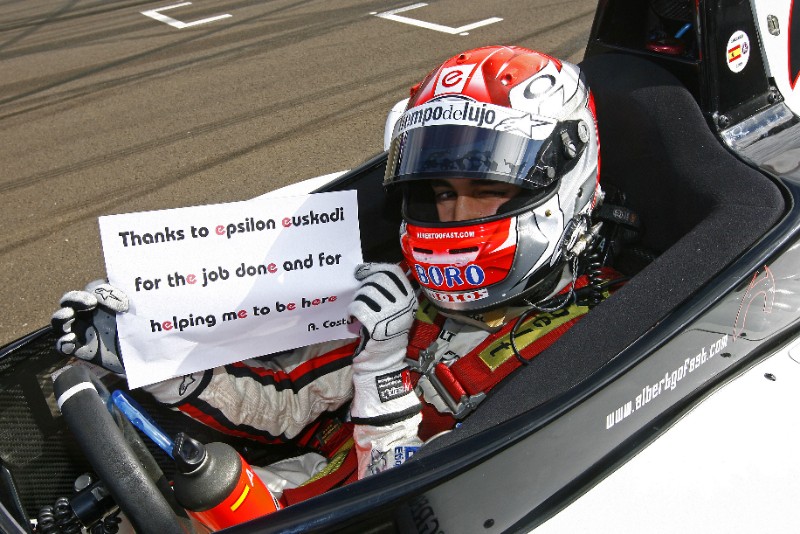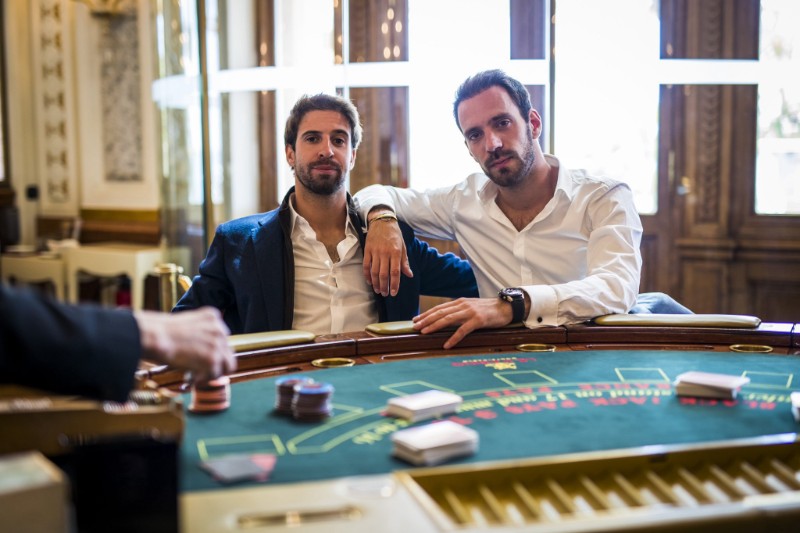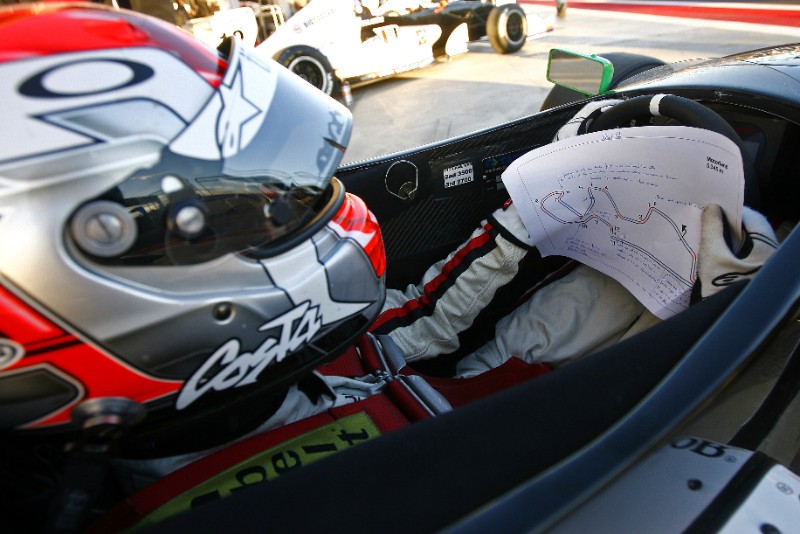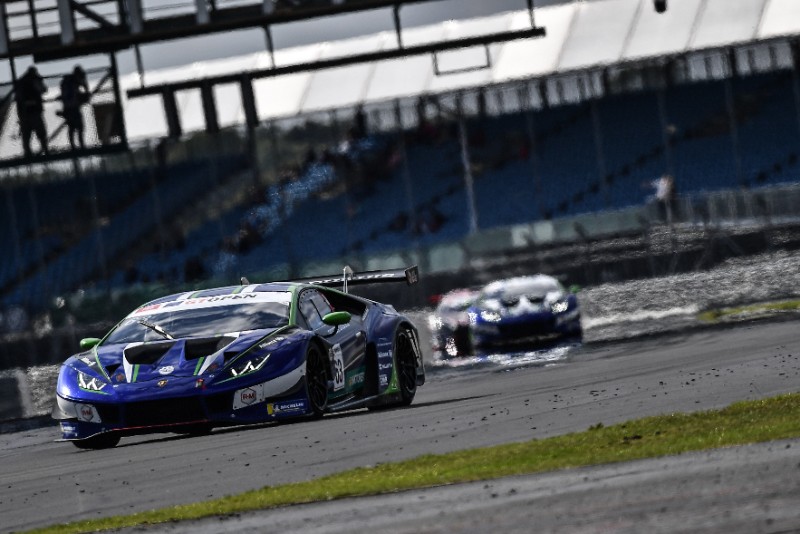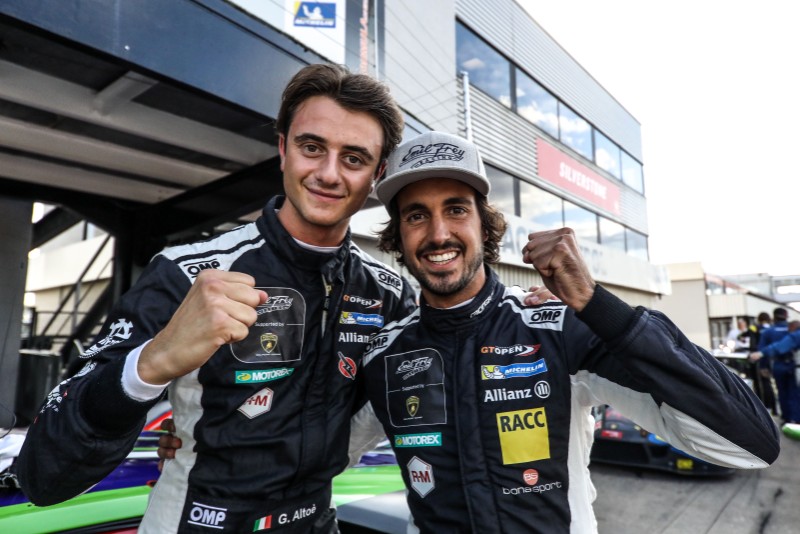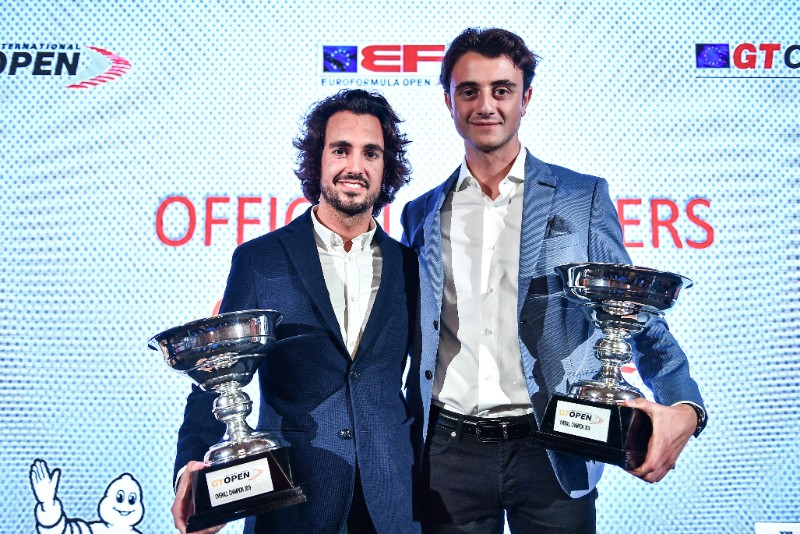
Photos: Francois Flamand / DPPI
In 2009, Antonio Felix da Costa and Jean-Eric Vergne both suffered crushing defeats in Formula Renault. The new DS Techeetah team-mates were bettered by a driver whose short career has now resurrected in style
Heading into this weekend’s 2019-20 Formula E season opener in Saudi Arabia, the early odds for the title are on two drivers: two-time champion Jean-Eric Vergne and his recently signed team-mate Antonio Felix da Costa, formerly of BMW Andretti.
Vergne’s career redemption in the championship after a tricky spell with Toro Rosso in Formula 1 has been well documented, and when he spoke to Formula Scout about the ups and downs of his career he highlighted his title defeat in the Formula Renault Eurocup and Western European Cup as particularly bruising.
Da Costa, who drove for the Motopark team that Vergne and others deemed to be cheating, used similarly emotive language to describe the anguish of his 2009 defeat – and cried his eyes out at the time due to uncertainty over his racing future.
Red Bull was already backing Vergne’s career and placed him in British Formula 3 for 2010, while da Costa’s hopes were lifted in December when former F1 driver Tiago Monteiro decided to support his fellow Portuguese by organising a bespoke development programme through his Ocean Racing Technology GP2 team.
Albert Costa, who beat both and received the Eurocup title prize of €500,000, was actually in the worst situation of the three.
“2009 was a great year,” remembers Costa, who now races in sportscars.
“There was plenty of good drivers on the grid, like Kevin Magnussen, da Costa, Vergne. The level was so high. I was always fighting for the top three in each race, and it was a nice championship as it was with the World Series by Renault.”
Costa’s single-seater debut had come in British F3’s National class with Double R Racing in 2007, entering nine races before his funds dried up. He then moved to FR2.0, finishing eighth in Eurocup and fifth in WEC with Basque team Epsilon Euskadi.
“My team [Epsilon Euskadi] was amazing, that was my second year with them. The year before I was second in the WEC rookie standings, and the target was to win both championships [in 2009].
“I won 13 races in 2009, which was amazing. It was my first ever car title win, so I will never forget. I learned a lot. They created in me a proper driver, let’s say. I’m thankful to all the people who was helping me at that time. It’s already been 10 years – oh, that’s 10 years this year! It’s cool, it’s cool.”
Costa, still only 29 and genuinely not looking a day over it, recomposes himself. If he was showing any signs of ageing, surely it would be from the pressure of racing against F1 juniors?
“I had pressure from my team in ’09, because they wanted to win the Eurocup title very badly. They’d lost the title the year before with Roberto Merhi, and won in 2007 with Brendon Hartley. They said I had to win it that year.
“‘Yes we believe in you, but you are not paying, we are paying for you. The deal is you have to win. If you don’t, you go home.’
“The pressure was there, but I like to race under pressure. It’s how I feel good, it’s how I feel naturally driving in my style. There’s small pressure I have [now in GT racing], I like more because it’s more exciting.
“[The €500,000 Renault prize] was why I kept racing. I had zero budget and come from a very humble family.
“In that moment my mum wasn’t working, my dad had a very small garage mending helmets and bikes. We could live a normal life, but we were not rich like 90% of the people in this [motorsport] world. My dad, from when I was very young, told me: if you want to race, you have to win. If you don’t win, you go home and you’re going to work like me.
“I always did my best, always feeling proud of what I’m doing. I knew that if I won the Eurocup, the answer would be to race a year later with Epsilon Euskadi in FR3.5. All the plans went well, I won, with the prize. Renault had been helping me as well to stay in the Eurocup, and of course [Epsilon Euskadi team principal] Joan Villadelprat helped me a lot financially – and to stay alive that year.”
The fiercely contested Eurocup went down to a final race showdown at Motorland Aragon, with Costa wrapping the title with a double podium and catching the eye of the observing international motorsport world.
“I had plenty of F1 contact, but my management contacts were very bad in that moment as I had nothing. Everybody who was coming, I was like: yeah, yeah, yeah you can help me, you can help me. I was young, I was alone, and I believed in people I had not to believe, and then all those F1 contacts went to nothing, because I was not in the right hands.”
Come the start of 2013, Costa was out of racing and da Costa was odds on to join Daniel Ricciardo or Vergne at Toro Rosso.
“[Da Costa and Vergne] are in a better position than me now. To win titles when you’re 18, is not the most important thing in the world because you can finish second or third but be in a better position like JEV was. He was with Red Bull, I was alone. Da Costa was alone like me, but he made a good move going to F3 that was better for his future [than FR3.5 straightaway].
“I had no money, so I had to choose [Epsilon Euskadi in FR3.5]. It was not a decision to make, really. And that’s hard.
“I have some pictures of JEV almost crying, and da Costa is crying behind the Aragon podium when he lost the title. I said to him: don’t worry. I won the title but maybe in the future you are in F1 and I’m not.
“And look, he was close to being in F1, Jean-Eric was in F1, and I’ve never tried an F1 car. But I’m happy with what I have now. I’m a professional racing driver, I’m getting paid. The best is yet to come. I really am more happy, more excited. Everything is going a bit better. And for me that is the most important thing in life right now.”
Before talking about how Costa has resurrected his racing career, it’s important to detail how it collapsed after his FR2.0 titles.
“I broke my hand in a test so I wasn’t able to do all of the 2010 pre-season. I only did one day of testing in the FR3.5 car. But I jumped in the car and I finished fourth twice then in Monaco I was on the podium.
“I was with a lot of pain in my hand because I was not able to hold the steering wheel with all my power. But to finish on the podium on my first ever visit in front of many F1 teams that were really looking at me, that was amazing. It’s one of the things that I will also never forget. The rest of the season was more or less so-so, because I had a lot of up and downs. But that race was almost better than winning the Eurocup title.”
One key detail Costa omits was that he was helped in recovery from his quite serious injury by tennis star Novak Djokovic.
Prior to Monaco, he’d already made an impact. In his first FR3.5 race at Aragon, he charged from 21st to sixth before spinning off, then went from 12th to fourth on the opening lap of race two. Later in the season he was struck by illness, but once back to full health drove from 16th to sixth at the Hungaroring and converted a front row start in race two there into second place.
At Silverstone he overcame a faulty visor to make the podium, and was only denied fourth in the points on win countback. Come the end of the season, Epsilon Euskadi collapsed. After a shot at Le Mans prototype racing, the team had invested heavily on a bid to join F1, and had designed a car before the FIA rejected its application. Villadelprat was soon being linked to corruption.
“At the end of 2010, with Epsilon Euskadi gone, they created a new team with the same people that had working there called EPIC Racing. With nothing we created a nice team that fought for victories, and I almost finished third in the standings.
“It was a poor team. I raced for them and I’m very thankful for that as they continued to believe in me. I still had no money, they had no drivers, so we made an agreement that I’d race for them. Beyond staying at home, it was the best thing I could do.”
Such was the lack of cash, Costa almost didn’t make it to the Barcelona season finale where he took a dominant first win.
“I won the last race, and on the TV interview they asked why I wasn’t so happy. I said:
‘Of course I’m not happy. I’ve won my last race in FR3.5, I’ve finished fourth in the standings because yesterday I crashed and I lost [third], and I have nothing for next year. I will be at home. I see my ass in my home, and I don’t want to see my ass sitting on my sofa, I want to see my ass racing around the world.’
“They were a bit shocked.
“One guy came to my father’s workshop, as he saw in the news that I had nothing and was looking for someone to put money in to go up to F1, GP2 or IndyCar. I gave him my details to take to sponsors, teams, whatever, he says. He went to them, we worked together almost three months, he found sponsors and money, and when we had the flight to have the meeting with F1 teams to be third driver, and with Carlin to race in GP2 or World Series, this guy then disappeared with all the money.
“We had a fake name, fake everything from him, and that was it – I was forced to stop [single-seaters].
“I raced in 2012 in the Eurocup Megane Trophy, where I won the title, thanks to Jerry Canevisio of Oregon [who later saved Formula 2 champion Mirko Bortolotti‘s career].
“I’d passed from FR3.5 to GT cars, but that wasn’t a very fast GT. And after that moment I stopped racing.”
Like many others whose finances don’t allow them to remain in the driving seat, Costa switched to coaching young drivers.
“I was with Carlin so I was coaching George Russell, Antonio Giovinazzi, Tom Blomqvist, Jake Dennis, Carlos Sainz Jr, Tom Dillmann, Sean Gelael. Actually some of them I am racing against now. I had a friend that I coached for one year in Moto3 because when I was younger I raced motorbikes, so I know more or less what you have to do.
“Phwoah, I coached so many good drivers, and Carlin was a very nice place to be coaching at. It was all good and fun.”
Costa’s girlfriend at the time saw the picture a little differently, as he explains by recounting a conversation they had after his first year of coaching.
‘Hey, I saw on your Wikipedia that you were good. Why are you not racing? I see those names on TV like Ricciardo. This guy has won his first ever grand prix, Valtteri Bottas is in Williams etc. You beat them or at least you fight, so that means you are not that bad. I mean, you deserve to be the same [as them].’
‘Look,’ I said to my ex-girlfriend with intent. ‘The situation is this. In this world you need money, there are many drivers like [this] last year. Robin Frijns won the Eurocup as a rookie, he won FR3.5 as a rookie, he won everything and he is not in F1 because the talent is not everything. If you have money, or you are in a good position as a junior driver like Ferrari, Gravity (Renault) or Red Bull, you have a chance. If not, you are done. This guy is a bit more rich than me, and he’s not in F1, and he’s more talented than me.’
‘But maybe you can be happy racing in another series.’
“I said ‘yeah’ to satisfy her, but in that moment I was like a racehorse, just looking at F1. I wanted to be there, because that was my dream from since I was young.
“Two weeks later she tried again, and I initially said ‘yeah, yeah, yeah’ again to keep her happy.
‘Albert, you cannot be like this. Every weekend that there is F1, you are angry with everybody. I cannot talk to you, you don’t want to do any plans, you just want to sit and watch the races.
Let’s make a plan. We’re going to work on a book, a presentation, and every time you go to do coaching in Euroformula Open, European F3 or wherever you go, for sure there is another series around the back. So there, and say “Hi, I’m Albert Costa, and this is my situation”.’
“So I started to do it. One day I got a call from Emil Frey [boss of the eponymous GT team] and he asked if I was free. I was, and he said he wanted a driver and was planning a test. If I was fast, he would then speak to me about racing the next year.
“I went to the test, it went well, and after that I’ve been here for four years.”
Costa’s racing return in Frey’s self-developed Jaguar sportscars wasn’t an immediate success, but when the team switched allegiances to Lexus the results immediately improved. Four wins in International GT Open in 2017 was followed by victory in the 2018 Paul Ricard 1000km, which piqued Lamborghini’s interest and led to it joining arms with the team this year.
Now tasked with developing the all-new Lamborghini Huracan GT3 Evo, Costa has mostly used 2019 to dominate GT Open. He and 19-year-old co-driver Giacomo Altoe, formerly of Italian Formula 4, triumphed in a season full of drama, and Costa then helped another Lamborghini team to win Blancpain GT Series’ overall and Endurance titles in a cameo appearance.
“I have to accept and say that when I was in single-seaters, I wasn’t grounded because in formula you feel like a star. Everything comes easy.
“When I stopped racing I changed many things. My friends, my girlfriend, my personal life changed a lot to be a better one and to be more humble, because I was flying a bit [as a teenager]. Now I’m more human, and working harder to do what I want. This has all happened for something.”
After Costa has finished telling his departure and return to racing in one long uninterrupted answer, Formula Scout stops holding its breath. From fraud on the cusp of F1, to a Wikipedia-focused girlfriend and international glory, it’s a wild story.
“Yeah, it’s crazy. From nothing, to here.”


